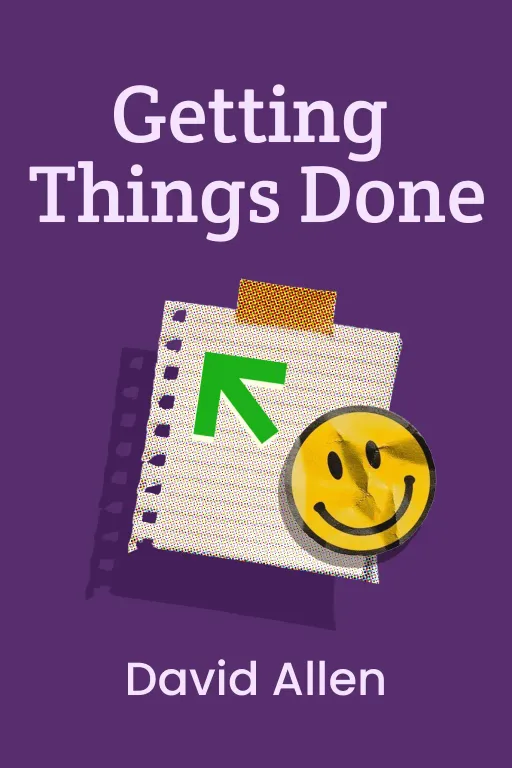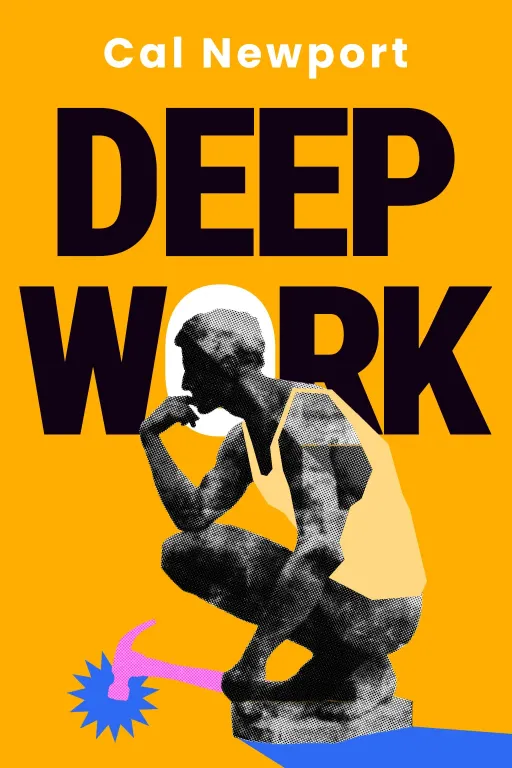
Mind Like Water: An INTP's Guide to Engineering Stress-Free Productivity
10 minGolden Hook & Introduction
SECTION
Dr. Warren Reed: Linh, as a project manager and a self-professed 'Thinker,' you live in a world of big ideas, strategies, and creative campaigns. But what happens when your brain, the very place where those ideas are born, becomes the messiest office imaginable?
Linh: That's a daily reality, Warren. It feels like having a thousand browser tabs open in my head at all times. You're trying to focus on one big, creative problem, but notifications from ten other projects keep popping up. It's the ultimate paradox of knowledge work.
Dr. Warren Reed: Exactly. And that's why I wanted to talk about David Allen's classic, "Getting Things Done." He starts with a powerful premise, quoting someone who said, "Your ability to generate power is directly proportional to your ability to relax." In our hustle culture, that sounds almost heretical, doesn't it?
Linh: It really does. We're taught to equate busyness with productivity. The idea that true power comes from a state of calm feels completely counterintuitive, especially in a fast-paced field like marketing.
Dr. Warren Reed: Well, today we're going to unravel that paradox. We'll explore how to engineer that state of relaxed control. We'll dive deep into this from two perspectives. First, we'll explore why our brains are fundamentally bad at managing 'stuff' and how that creates stress. Then, we'll break down the elegant five-step method for processing that 'stuff' into a state of relaxed control.
Deep Dive into Core Topic 1: The Brain as a Bad Office
SECTION
Dr. Warren Reed: So let's start with the core problem. Why are we so stressed? Allen's diagnosis is simple: we're using our brains for the wrong job. We ask them to be a storage unit, a filing cabinet, and a personal assistant. But our brain is a CEO, not a clerk. It's for having ideas, not holding them.
Linh: I love that framing. The CEO shouldn't be the one remembering to buy milk.
Dr. Warren Reed: Precisely. Allen calls all those things we need to remember 'open loops.' Every single thing, from 'email Susan about the Q3 budget' to 'fix the leaky faucet,' is an unresolved commitment that stays open in your head. And these open loops consume what he calls 'psychic RAM.' Your mental processing power is constantly being drained by the background task of just trying not to forget things.
Linh: That's the cognitive load we talk about in user experience design, but applied to our own lives. It’s the mental effort required to operate, and if it's too high, the system crashes. In this case, the 'system' is our focus and creativity.
Dr. Warren Reed: Exactly. And the brain is a terrible system for this. Allen gives a perfect, simple story. Let's call it 'The Flashlight with Dead Batteries.' Imagine you're at home, you open a kitchen drawer, and you see a flashlight. Your brain, ever so helpfully, pings you: "Hey, the batteries in that flashlight are dead. You should replace them." It's a useful thought. But what happens a few days later when you're at the grocery store, standing right in the battery aisle?
Linh: Complete silence. Your brain is thinking about what to make for dinner, or that weird comment a client made. The flashlight doesn't even exist in that moment.
Dr. Warren Reed: Not a peep. Your brain reminded you when you couldn't do anything about it, and it failed to remind you when you could. It's a brilliant idea-generator but a horribly inefficient reminder system. It works on random association, not on context and opportunity.
Linh: That is so true. It's why I'll remember a brilliant idea for a marketing campaign while I'm in the shower, but forget to bring up a critical point in the actual campaign meeting. My brain serves me the right information at the entirely wrong time, and it's incredibly frustrating. It kills the 'flow state' we're all chasing.
Dr. Warren Reed: And that's the core of the problem GTD sets out to solve. The goal is to get all of those 'dead battery' reminders out of your head and into a trusted, external system. Only then can your brain stop being a stressed-out, unreliable office manager and go back to its real job: being the brilliant, creative CEO.
Deep Dive into Core Topic 2: The 5-Stage Workflow
SECTION
Dr. Warren Reed: So, if the brain is a bad office, how do we build a good one? This brings us to the engine of GTD. It's not just a set of tips; it's a complete, logical workflow. There are five stages:
Dr. Warren Reed: Look at your system frequently.
Dr. Warren Reed: Make choices about what to work on.
Linh: As an INTP, a five-stage model is music to my ears. It’s a system, an algorithm. It’s not just 'try harder.'
Dr. Warren Reed: Exactly. And the most powerful stage, the one that creates all the magic, is 'Process.' This is where you take your pile of 'stuff' and make a series of rapid-fire decisions. For every single item, you ask: 'What is it?' and then, 'Is it actionable?'
Linh: That's a critical filter. So much of what clutters my mind isn't even something I need to act on. It's an article I might read, an idea that's half-baked, a random note.
Dr. Warren Reed: Right. If it's not actionable, you have three choices: trash it, file it for reference, or put it on a 'Someday/Maybe' list. But if it actionable, Allen introduces the magic wand: The Two-Minute Rule.
Linh: I've heard of this. If it takes less than two minutes, do it now.
Dr. Warren Reed: Do it right then and there. The logic is that it would take you longer to log, track, and review that small task than to just get it done. It's an efficiency cutoff. There's a great story in the book about a vice president at a software company who was drowning in email. He had over 800 messages in his inbox. He was spending his weekends just trying to catch up.
Linh: Sounds like a typical Monday morning for a project manager.
Dr. Warren Reed: It was destroying his family life. A coach came in and saw the problem wasn't the volume of email; it was the lack of a decision-making process. The VP was 'staging' emails to deal with later, creating hundreds of open loops. The coach had him apply the Two-Minute Rule. As they went through the inbox, if a reply took less than two minutes, he wrote it immediately. If it was just reference, he filed it. If it was trash, he deleted it. In a single afternoon, his inbox went from 800 messages to just one screenful of items that required real work.
Linh: That's a system transformation. It's not about email management; it's about decision management. We often get paralyzed by big, amorphous projects on our lists, like 'Launch New Ad Campaign.' That feels huge and intimidating.
Dr. Warren Reed: It is. Because it's not an action. It's a project.
Linh: Right! But applying this thinking, the might be 'Email Sarah to schedule a 15-minute kickoff call.' That's a one-minute task. Or 'Draft three potential taglines.' That's a bigger task, but it's a defined action. The book has that great quote: "Things rarely get stuck because of lack of time. They get stuck because the doing of them has not been defined." This process forces that definition. It turns a mountain of anxiety into a single, climbable step.
Dr. Warren Reed: That's the entire game. You're not trying to do the project. You're just doing the next physical, visible action.
Synthesis & Takeaways
SECTION
Dr. Warren Reed: So, we've really journeyed from a problem to a solution. The problem is that we're using our brilliant, creative minds as a low-grade, unreliable filing system, which creates constant, low-level anxiety.
Linh: And the solution is to engineer an external system, a 'second brain,' that you can trust completely. It's about moving from being a frantic manager of your own mind to being the calm, focused director of your attention. It’s not about managing time; it’s about managing your focus.
Dr. Warren Reed: Perfectly put. So for everyone listening, especially the analytical thinkers like Linh who love a good system, here's a simple experiment to start. It's called the 'Mind Sweep.'
Linh: I'm intrigued.
Dr. Warren Reed: Set a timer for 30 minutes. Take a stack of plain paper. And write down, on separate sheets, every single thing that has your attention. Big, small, personal, professional. 'Change the world.' 'Buy cat food.' 'Call mom.' 'Figure out the meaning of life.' 'Get new tires.' Don't organize it. Don't judge it. Just get it all out of your head and onto the paper.
Linh: As an INTP, the idea of externalizing my entire mental map onto a physical medium is both terrifying and incredibly appealing. It’s like creating a diagnostic of your own cognitive load. You can't fix the system until you see all the moving parts. That's where the clarity has to begin.
Dr. Warren Reed: That's exactly it. You're not solving anything yet. You're just collecting. That's step one. And what most people find is that the simple act of getting it all out provides an immediate, profound sense of relief and control. It's the first step toward achieving that elusive state: mind like water.
Linh: A state where you can finally give your full attention to the task at hand, whether that's writing a masterpiece or, as the book says, just cleaning a window. That's a powerful goal.
Dr. Warren Reed: A very powerful goal indeed. Linh, thank you for thinking through this with me.
Linh: This was fantastic, Warren. I feel like my own psychic RAM just got a major upgrade.









